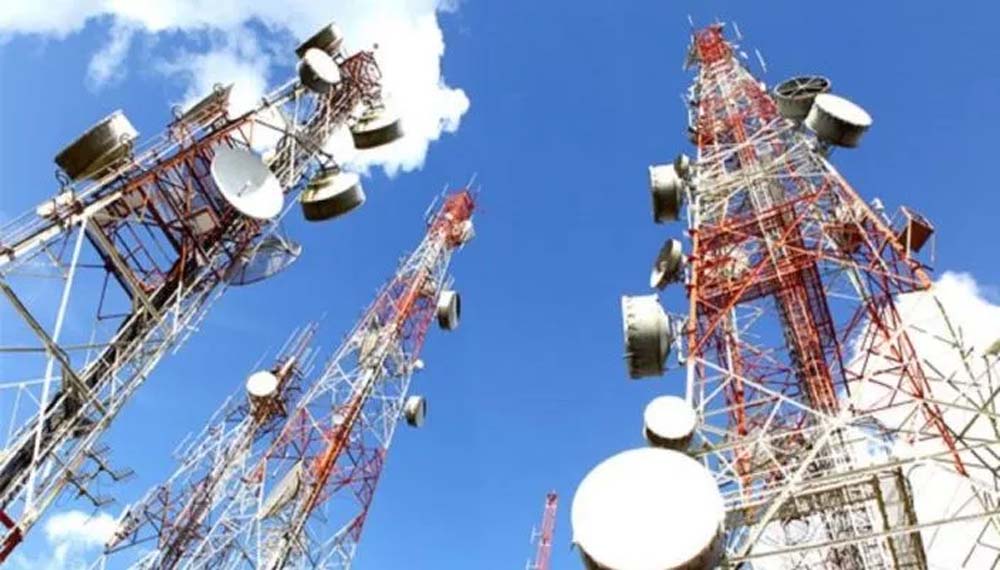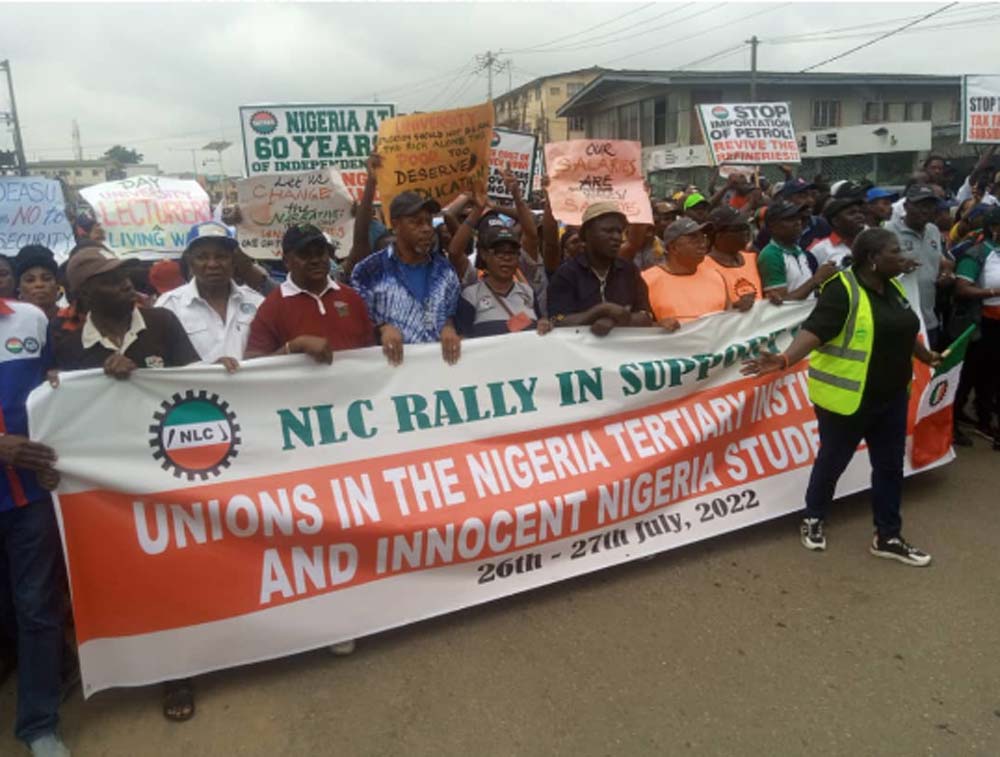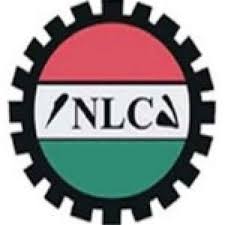NEWS
NLC Steps Down Telecom Tariff Hike Protest On FG’s Intervention

Sequel to the intervention of the Federal Government of Nigeria (FGN) the Nigeria Labour Congress (NLC) has suspended its planned nationwide protest against the recent 50 percent hike in telecom tariffs.
It was gathered that the organised labour put on ice its planned billed for Tuesday, February 3, 2025, after meeting with government representatives at the Office of the Secretary to the Government of the Federation in Abuja, on Monday.
Recall that the telecom regulator, the Nigerian Communications Commission (NCC), in defending the 50 percent tariff increase, cited rising operational costs driven by inflation, foreign exchange fluctuations, and higher energy expenses.
ALSO READ: NLC Declares Nationwide Protest Over Telecom Tariff Hike
According the NCC’s statement on the matter, the adjustment was in line with its mandate under the Nigerian Communications Act, 2003 to ensure the financial sustainability of the telecom sector.
The regulator’s stance, however, infuriated the NLC, who rejected the tariff hike and demanded a reduction to five percent, and threatened a nationwide protest if its demands were not met.
The NLC condemned the hike as insensitive and unjustifiable, because it would impose an extra burden on Nigerian consumers.
The President, NLC, Joe Ajaero, reiterated its demand for a significant reduction after the National Administrative Council meeting of the NLC.
He said, “After extensive discussions, the following resolutions were reached: NAC-in-session totally rejects the 50 percent telecom tariff hike, which it considers too harsh for citizens. It, therefore, strongly condemns the Nigerian Communications Commission’s decision to approve the increase.
“This decision is insensitive, unjustifiable, and a direct attack on Nigerian workers and the general populace, who are already suffering under worsening economic hardship caused by government policies beyond their control.”
The NLC called on Nigerians to prepare for a nationwide boycott of telecommunication services in protest against the increase.
Despite the union’s pressure, telecom operators remained firm that the current adjustment was necessary to maintain service quality and support network expansion in an increasingly challenging economic environment.
They ruled out negotiations with organised labour on the tariff increase, insisting that no reduction would be made despite the labour threat.
In the opinion of the Chairman of the Association of Licensed Telecommunications Operators of Nigeria (ALTON), Gbenga Adebayo, the approved increase is vital to sustaining telecom operations amid escalating costs.
“This increase is a lifeline that enables us to survive. Anything lower would be like giving someone who needs 100 litres of oxygen only a fraction — barely enough to keep them alive but insufficient for long-term survival,” he asserted.
In the bid to ensure maximum impact, the NLC mobilised the electricity, aviation workers and civil society groups for the protest.
However, following the Monday meeting, the NLC resolved to put on ice the demonstration to give room for further discussions.
Ajaero told the media after the meeting that the government had agreed to set up a larger committee to review the entire tariff structure.
According to him, the committee will be composed of five representatives from both sides and is expected to submit its findings within two weeks.
Ajaero stated, “We emphasised that the NLC is the largest organisation in Africa, and no stakeholder consultation can exclude us and still stand. On that basis, they agreed to form a broader committee to ensure a fair and inclusive agreement to look at the entire tariff structure as a model to come out with a realistic and all-inclusive agreement.
“So, the committee will be made up of five representatives, from both sides and expected to come out with a result after two weeks. That will determine the next line of action and the process of engagement.’’
He outlined that NLC’s probably next steps, would include protests, boycotts, or service withdrawals, depending on the outcome of the committee’s work.
“The symbolic action of submitting the letters tomorrow (today) will be put on hold until the outcome of such a committee. The outcome of such a committee is what will determine our next line of action in terms of protest, in terms of boycott, in terms of even withdrawal of services, which are the three issues we put online,” he explained.
While the planned symbolic submission of protest letters had been put on hold, Ajaero noted that the NLC remains concerned about other pressing economic issues, including electricity tariffs and burdensome taxes on workers.
“We have also expressed our displeasure over the high electricity tariff and the unbearable tax regime, which is killing workers. These remain unresolved issues that must be addressed,” the labour leader said.
On his part, the Minister of Information and National Orientation, Mohammed Idris, maintained that the NCC raised the tariff following a study.
He stated that the NLC agreed to look at the study to come up with its resolutions, adding that a committee of five representatives each from both sides had been instituted.
The minister said, “The crux of the matter is that there is already a study that was conducted by the NCC that led them to arrive at this 50 percent increase. Now, we are discussing this with Labour.
“Labour has agreed that they will look at that study, and then a small committee has been set up to look at that study once again and come up with a final resolution for the consideration of government and Labour in about two weeks.
“So, the summary of it is that the Nigeria Labour Congress and the delegation of the Federal Government have set up a committee of five each.
“We are going to meet here continuously for the next two weeks, and at the end of the second week, we will now come up with a recommendation that we will give to the government and the organised Labour for final consideration.
“Both the organised Labour, the NLC particularly, and the government people have sat down here and have agreed on this position.
“So, there won’t be any protest tomorrow (today) by the Nigeria Labour Congress, and there will be some form of report that will come up in about two weeks from now to consider the study and other considerations by both parties.”
NEWS
FG To Launch Forensic Audit Of NNPCL Amid Economic Reforms, Says Edun
The Federal Government of Nigeria is set to launch a forensic audit of the Nigerian National Petroleum Company Limited (NNPCL), in a major move aimed at enhancing transparency and accountability in the oil and gas sector.
This was disclosed by the Minister of Finance and Coordinating Minister of the Economy, Wale Edun, at the ongoing Nigerian Investor Forum, held on the sidelines of the IMF/World Bank Spring Meetings in Washington DC.
READ ALSO: Loans Necessary For Budget Despite High Revenue Collections – Wale Edun
Edun explained that the upcoming audit, along with recent changes in NNPCL management, is part of a broader effort to reform the state-owned oil company and rebuild trust in Nigeria’s economic institutions.
Addressing top global investors, including representatives from financial giant J.P. Morgan, Edun outlined a series of bold economic reforms introduced by the administration of President Bola Tinubu.
He said the measures are already yielding positive results and have laid a strong foundation for future growth.
“Our goal is not just to maintain this momentum, but to accelerate it,” Edun said. “We are targeting seven per cent annual growth, and we believe the policies we have implemented have laid the groundwork to achieve this.”
According to Edun, Nigeria’s economy grew by 3.84% in the fourth quarter of 2024, with an overall annual growth rate of 3.4%.
He described the government’s economic strategy as “unprecedented,” adding that key indicators such as the budget deficit, trade balance, and exchange rate have all shown signs of improvement.
“We said we would do it, and now we have done it. This time, we’re staying the course,” he emphasized.
The minister also highlighted the government’s focus on agriculture as a critical driver of economic growth, saying efforts are underway to close the food supply gap by empowering local producers.
“We aim to close the food supply gap, not by importing more, but by enabling domestic producers to scale and innovate,” he said.
In the area of infrastructure, Edun announced that 90,000km of fibre optic cable has been rolled out to boost internet connectivity, especially for young Nigerians and the tech ecosystem.
Additionally, 4,000km of roads have been earmarked for private sector participation, with the first 1,000km already approved for construction.
International News
Russia Launches Deadliest Attack On Ukraine As Ceasefire Hopes Fade
In the early hours of Thursday, Kyiv was rocked by a devastating Russian missile and drone attack, described by Ukrainian officials as one of the most brutal strikes on the capital since Russia’s full-scale invasion began in 2022.
The Ukrainian air force reported that Russia unleashed 70 missiles and 145 drones overnight, targeting several cities across the country.
The barrage on Kyiv left at least nine people dead and over 60 wounded, including six children.
READ ALSO: Suspected Attack: Explosion Strikes Russian Consulate In France
Air raid sirens blared across the capital around 1:00 a.m., warning residents to seek shelter.
Moments later, loud explosions shattered the night, lighting up the sky and shaking buildings. “Phone calls can be heard from under the rubble — the search will continue until we are confident that we have found everyone,” said Interior Minister Igor Klymenko.
He confirmed that two children remained unaccounted for amid the chaos.
Rescue workers scrambled to pull survivors from under collapsed buildings. Fires broke out across multiple apartment blocks, and damage was reported in at least 13 locations.
In one tragic scene in the Sviatoshinsky district, a woman sat on a foldout chair beside a covered body, gently stroking the arm of a loved one killed in the strike.
Nearby, a bloodied woman clutched her dog as a first responder spoke calmly to her, trying to provide comfort amid the destruction.
Prime Minister Denys Shmygal condemned the assault in stark terms. “Cruise and ballistic missiles, drones, air bombs — Russia is cruelly and cynically firing missiles at Ukrainian cities, killing people while the world is making efforts to establish peace,” he wrote on social media.
The attack came just hours after Ukrainian President Volodymyr Zelensky reiterated his call for a ceasefire. “Stopping the killings is the number one task,” Zelensky stated online following a meeting between his aides and Western officials in London.
However, any momentum toward peace appeared to falter. Russian President Vladimir Putin has yet to respond to Zelensky’s offer to halt airstrikes on civilian areas and previously dismissed a joint U.S.-Ukrainian proposal for an unconditional ceasefire.
“Putin demonstrates through his actions, not words, that he does not respect any peace efforts and only wants to continue the war,” said Foreign Minister Andriy Sybiga. Echoing that sentiment, presidential aide Andriy Yermak declared, “Putin shows only a desire to kill.”
Former U.S. President Donald Trump, speaking hours before the attack, claimed a peace deal with Russia was close.
He blamed Zelensky for stalling negotiations by refusing to accept Moscow’s annexation of Crimea, stating that Ukraine’s position “will do nothing but prolong the ‘killing field’.”
Meanwhile, Russian forces expanded their offensive to other regions.
In Kharkiv, at least seven missiles struck a densely populated residential district, according to city mayor Igor Terekhov. Russia’s defense ministry also reported downing 87 Ukrainian drones, including 45 over Crimea.
Earlier this month, Russia’s campaign of aerial terror intensified. A missile strike on the city of Sumy killed at least 35 people, while another attack on Zelensky’s hometown, Kryvyi Rih, claimed 19 lives — nine of them children.
NEWS
Why NDLEA Wants Drug Tests For Corps Members, Couples
The National Drug Law Enforcement Agency (NDLEA) is intensifying its campaign against substance abuse by proposing mandatory drug integrity tests for National Youth Service Corps (NYSC) members and individuals preparing for marriage.
Chairman and Chief Executive Officer of the NDLEA, Brigadier General Mohamed Buba Marwa (Rtd), explained the rationale behind the proposal during a meeting with the NYSC leadership in Abuja on April 23, 2025.
Speaking to NYSC Director-General, Brigadier General Olakunle Nafiu, Marwa clarified that the tests are not intended to be punitive but are part of a broader strategy to curb drug abuse and intervene early in cases of dependence.
READ ALSO: NYSC Pulls Out Corps Members From Benue Community
“It is always better to detect drug use early before it gets to addiction, which eventually could get to psychiatric problems, and it becomes a danger to the user and society,” Marwa stated.
While welcoming the new NYSC chief, Marwa commended the scheme as “a national treasure and a veritable instrument of national unity.”
He highlighted the alarming rate of drug use in the country and called for collective efforts in tackling the challenge.
“The drug scourge has continued to devastate our kids, families, and communities everywhere. There’s nowhere you go in the country that you don’t have a drug abuse problem,” he said. “One in seven Nigerians between the ages of 15 and 64 uses drugs.”
Marwa emphasized that while NDLEA is working hard to restrict access and availability of drugs, reducing demand is equally important.
He urged NYSC to play a more active role in this regard.
“You have mentioned our efforts to cut off access and availability of these drugs but beyond that, we have to work with all stakeholders, including NYSC to ensure drastic reduction in the demand for drugs by our youths, and one of our strategies to address this is through our drug integrity test, which we’re advocating that NYSC should embrace for corps members.”
He also praised the introduction of the War Against Drug Abuse (WADA) clubs in NYSC camps, describing them as a positive development, while calling for further collaboration in areas such as prevention, counseling, and rehabilitation.
“This is a major drug demand reduction effort. In the same way we said, if you are getting married, both the bride and the groom should bring a drug-free certificate,” he added.
According to Marwa, early detection remains key to managing substance abuse and preventing it from evolving into more severe health or social issues.

















